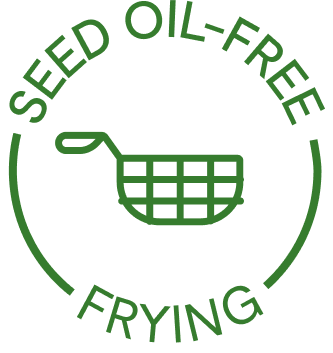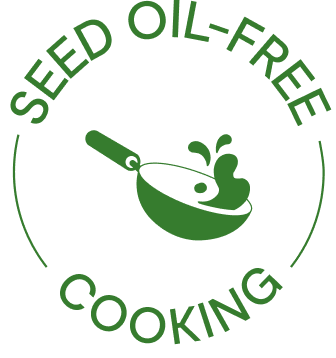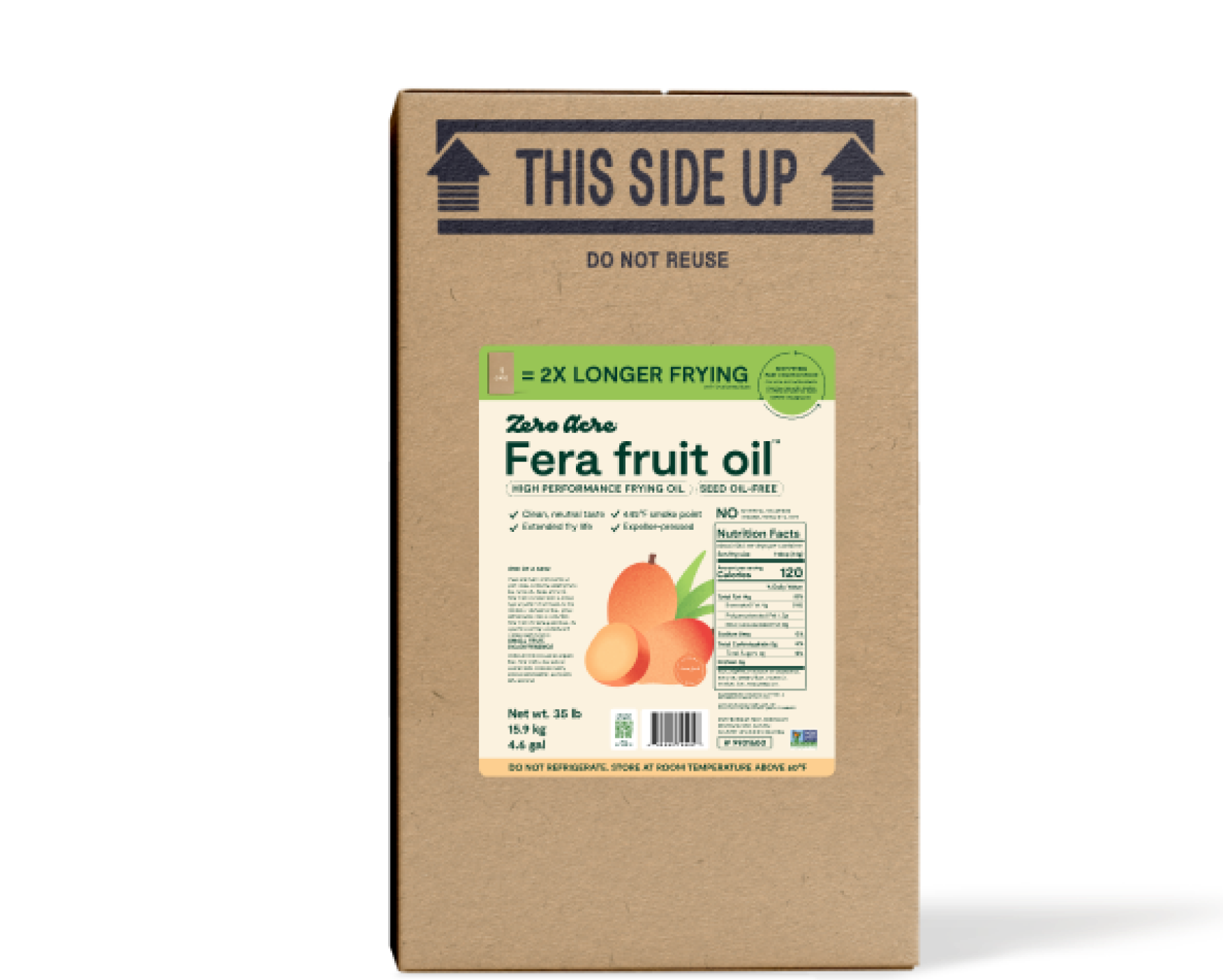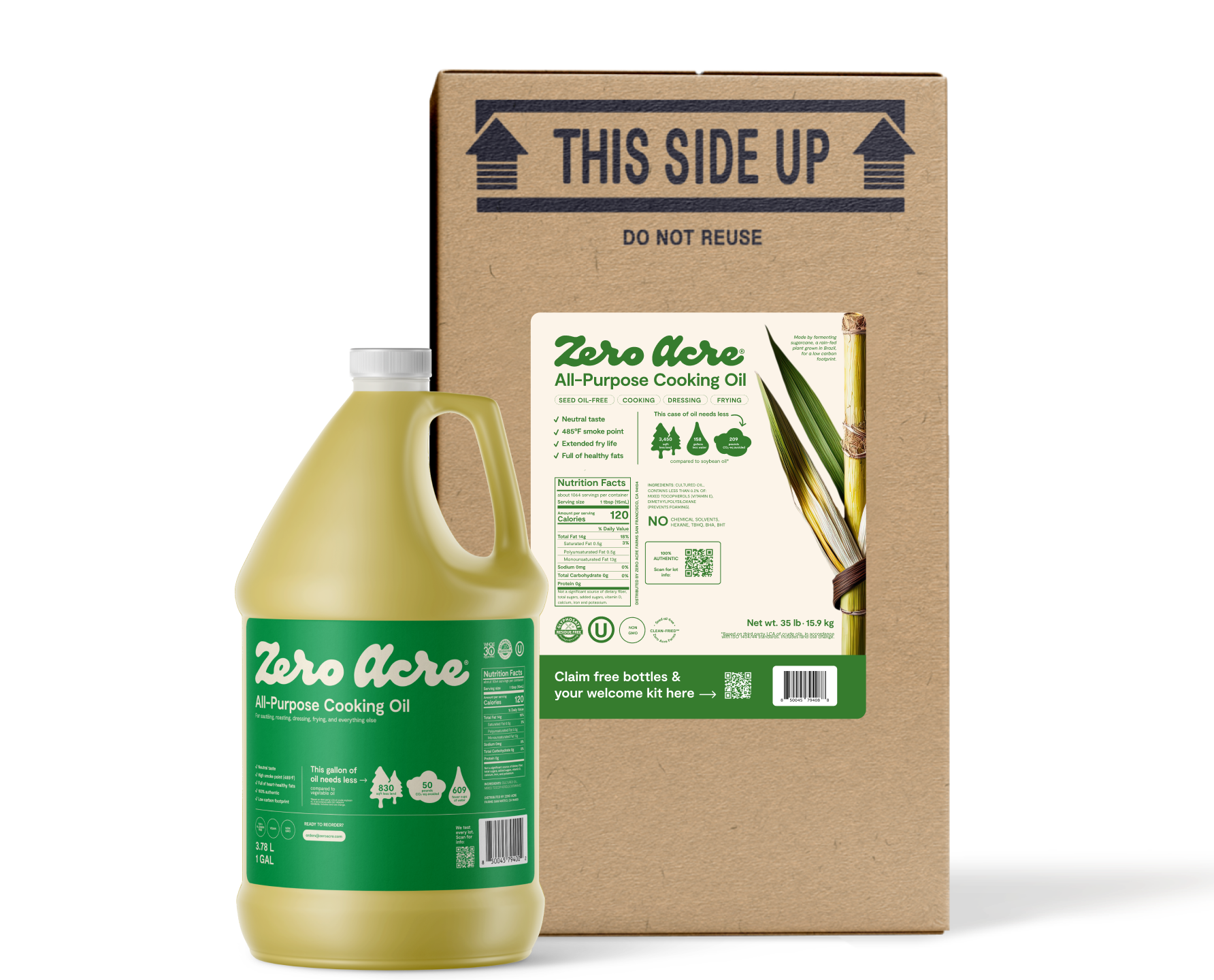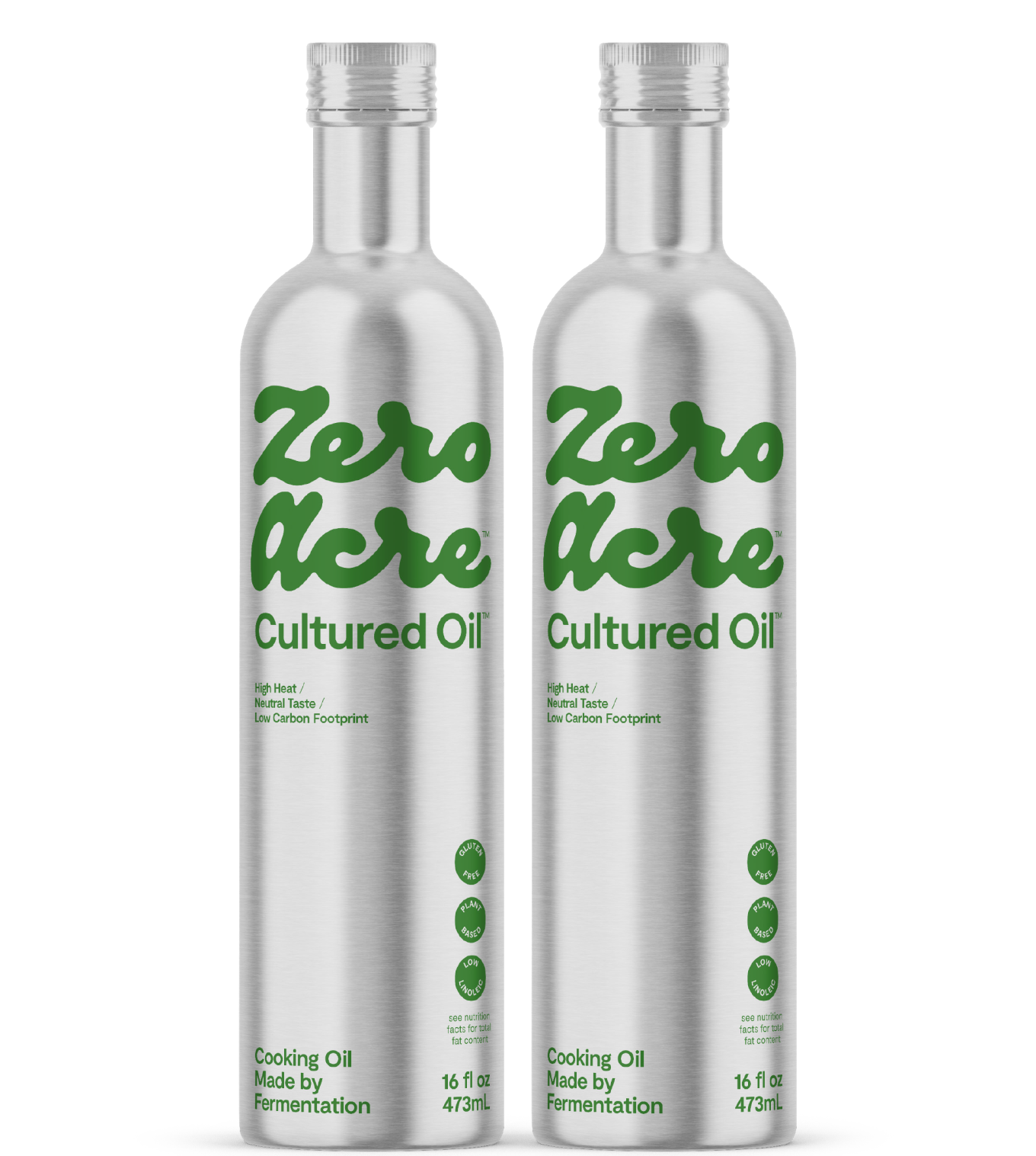Zero Acre FAQ
General
Zero Acre oil is an all-purpose cooking oil made from rain-fed sugarcane plants, the highest yielding crop in the world. Natural fermentation breaks down raw sugar from the sugarcane and converts it to oil with a neutral taste and low carbon footprint. This method uses 99% less water than olive oil and 87% less land than canola oil.
It’s full of the same fats we’ve eaten for hundreds of thousands of years, made up of 93% healthy monounsaturated fat (making it even higher in good fat than olive oil), 4% saturated fat, and 3% polyunsaturated fat.
Good for any recipe, it has a clean taste that makes your ingredients shine, and a high smoke point for low-toxin cooking.
Zero Acre oil is sky high in heart-healthy and heat-stable monounsaturated fat. Every batch of Zero Acre oil contains 90-94% monounsaturated fat, and less than 4% polyunsaturated (including less than 3% omega-6 linoleic acid) and saturated fat. Per 14 gram (1 tablespoon) serving of Zero Acre oil, that translates to about 13g monounsaturated fat, 0.5g saturated fat, and 0.5g polyunsaturated fat.
Look up the fat profile of your specific bottle of Zero Acre oil.
- Zero Acre oil contains more than 90% heart-healthy and heat-stable monounsaturated fat, even more than olive oil and avocado oil.
- Zero Acre oil contains less of the fats that have been linked to inflammation, heart disease, and poor health, with less than 3% omega-6 linoleic acid. That’s up to 10 times less than avocado oil, olive oil, and canola oil and 20-40 times less than sunflower oil, soybean oil, and grape seed oil.
- Zero Acre oil has a high smoke point and high oxidative stability, meaning it holds up to heat and storage, and doesn’t easily break down into compounds that harm our health. In a third-party study, cooking with Zero Acre oil was found to produce significantly fewer toxic aldehydes than with other cooking oils. You can read more about the results of this test in our health report.
- Zero Acre oil is vegan, keto, kosher, Whole30 Approved®, gluten-free, soy-free, nut-free, allergen-free, pesticide-free, glyphosate-free, non-GMO, and deforestation-free.
Zero Acre oil has a low environmental impact compared to most vegetable oils and offers a scalable solution to many of the environmental problems caused by vegetable oils. The production of Zero Acre oil results in:
- 87% less land use than canola oil
- 86% less greenhouse gas emissions than soybean oil
- 99% less water consumption than olive oil
- Comes in an infinitely-recyclable aluminum bottle
In order to put numbers to the environmental impact of different oils, an independent product life cycle analysis (LCA) was performed. The analysis found that the process behind Zero Acre oil results in a lower carbon and water footprint than nearly all major commercial vegetable oils.
A separate analysis looking at land use efficiency (the amount of land needed to produce one metric ton of oil) demonstrates that Zero Acre oil has the highest oil yield per acre compared to most major commercial vegetable oils.
Compared to the production of soybean oil, for example, Zero Acre oil emits 86% fewer greenhouse gases, consumes 83% less water, and uses 90% less land. Learn more about the results of this analysis in our sustainability report.
- A clean, neutral taste and high smoke point (up to 485ºF) make Zero Acre oil a versatile upgrade for all-purpose cooking duties.
- You can use Zero Acre oil for everything — deep fry, stir fry, roast, bake, sauté, dress, spray, brush, and drizzle.
- Zero Acre oil is liquid at room temperature and stays liquid in the fridge, making it great for dressings and marinades.
- Zero Acre oil has a high smoke point and high oxidative stability, meaning it holds up to heat and storage, and doesn’t easily break down into compounds that harm our health. In a third party study, cooking with Zero Acre oil was found to produce significantly fewer toxic aldehydes than with other cooking oils. Read more about the results of this test in our health report.
Zero Acre oil contains natural antioxidants, including alpha-tocopherol, beta-tocopherol, gamma-tocopherol, and delta-tocopherol, collectively called “mixed tocopherols,” a form of vitamin E. Mixed tocopherols are found naturally in many foods, including olive oil, nuts, seeds, and spinach and provide protection against oxidation (rancidity).
As part of our mission to improve the health of not only people, but also the planet, we use 100% recyclable aluminum packaging, in addition to a 100% recyclable kraft shipping box.
Aluminum is lighter and more sustainable than glass and infinitely recyclable. Infinitely recyclable refers to materials that can be recycled an infinite number of times without the quality of the material degrading. While the phrase “recyclable” is attached to countless products these days, that doesn’t mean they can all be recycled forever.
Today, about 75% of all aluminum produced in history, nearly a billion tons, is still in use. Studies find that consumers are also about 70% more likely to recycle aluminum than glass or plastic. And because aluminum is lighter than glass, it is more environmentally friendly in transportation.
Unlike glass (even dark green or amber-tinted bottles), aluminum packaging also completely blocks UV light, making the oil less susceptible to oxidation, rancidity, and waste. It’s also less susceptible to breaking or cracking than glass, further reducing waste.
We named ourselves Zero Acre Farms because we intend to steadily decrease the amount of land needed to produce healthy and widely available cooking oils. Already today, a mid-size fermentation facility produces ~90-fold more oil in a week than the same amount of land would produce from soybeans in a year.
In everything we do, we strive for zero harm to both the natural environment and human health; that means zero acres harmed and zero chronic disease. That is our North Star.
When we look at the vegetable oil industry, which is cutting down forests and plowing through natural habitats at an alarming rate, while filling our foods with substances that are truly bad for us, we believe our goal is well worth pursuing, even if it doesn’t happen overnight.
In short, our name is our goal. And we hope it makes people stop and think about what’s possible.
We are always looking for extraordinary people who believe a healthier world is possible with better oils and fats. To see openings and apply, visit our careers page.
We sure do! You can apply to join the movement HERE.
Please contact us if you are interested in purchasing Zero Acre oil in bulk.
For now, only at the Zero Acre Farms website. We’re working hard to become the oil of choice at your favorite restaurants and in packaged foods. Zero Acre oil may be coming to a restaurant near you, so stay tuned. Follow us on social media and subscribe to our newsletter for any updates!
Each bottle of Zero Acre oil is linked to a single origin of production, and customers can scan a QR code on the back of their bottle to look up its best by date and fatty acid profile that guarantees its authenticity. Beyond authenticity, we test each batch of Zero Acre oil multiple times for quality and purity, across a number of different measures, including a comprehensive fatty acid profile, free fatty acids, peroxide value, antioxidant content, and moisture.
Fermentation
Step 1: Start with rain-fed sugarcane plants.
These grasses are sourced from South America where they grow abundantly up to 20-feet tall. As the highest yielding crop in the world, sugarcane enables the production of cooking oil using 99% less water than olive oil and 87% less land than canola oil. Unlike the annual monocrops used to make most vegetable oils, sugarcane is a perennial crop – meaning harvesting sugarcane is like mowing the lawn instead of ripping a plant out of the soil every year.
We use non-GMO sugarcane from Brazil. Our supply chain partners use satellite imaging (20 years of data) through Global Risk Assessment Services (GRAS) to do an initial assessment of each growing region. No deforestation has been identified within the sugarcane harvesting area, and 0% of sugarcane growing regions are in protected areas, as defined by IUCN Categories I to VI, to ensure operations do not pose a risk to biodiversity.
Step 2: Convert sugar to oil through fermentation.
Raw sugar from sugarcane ferments in tanks over a few days. The sugar is naturally broken down and converted into oil – just as fermentation converts sugar into alcohol to make beer or wine. The result is a liquid cooking oil high in healthy fats with a clean, neutral taste.
Natural fermentation always involves a culture that converts sugars from milk, wheat, barley, or sugarcane into foods like cheese, bread, beer, rum or even oil. Algae and yeast are the most productive cultures when it comes to the fermentation of sugar into oil.
Step 3: Purify & test for quality.
Once fermentation is complete, the oil is purified and tested for freshness and quality. We even share the specific fat profile and antioxidant content of every bottle of oil. Adulteration in the oil industry is a big issue and it’s why we make sure that Zero Acre oil is always pure and authentic.
Studies have found that 82% of store-bought avocado oils are rancid or adulterated with seed oils, and an estimated 75-80% of extra virgin olive oils sold in the US are fraudulent [*,*].
Most all-purpose cooking oils are made by extracting small amounts of oil from resource-intensive crops often using harsh chemicals. Instead, we turned to the culinary art of fermentation to convert abundant, environmentally-friendly sugarcane plants into a healthier, more sustainable cooking oil with a clean, neutral taste.
Through the natural process of fermentation, we’re able to craft an all-purpose cooking oil with even more good fats than olive oil, and a really tiny impact on the environment compared to most vegetable oils. Fermentation has been used in kitchens for centuries – and now it’s helping our health, the planet…and french fries.
Learn more about fermentation.
Zero Acre is made by fermenting raw sugar from sugarcane into an all-purpose cooking oil. During the fermentation process, raw sugar from sustainably grown sugarcane, the highest yielding crop in the world, is naturally broken down and converted into oil – just as fermentation converts sugar into alcohol to make beer or wine. The result is a cooking oil high in healthy monounsaturated fats, with a clean, neutral taste. rich in healthy monounsaturated fats.
Thanks to the magic of making healthy fats with fermentation and not conventional oil crop agriculture, the production of Zero Acre oil is location agnostic. That means Zero Acre oil can be produced anywhere in the world. Currently, our fermentation partners are located in North America, South America, and Europe. If any one continent experienced a natural disaster, there would still be a supply of Zero Acre oil.
Zero Acre oil production results in zero deforestation. In contrast, millions of acres of biodiverse rainforest must be destroyed for oil crop agriculture to produce oils like soybean, palm, coconut, and others. Many vegetable oil crops only grow near the equator and compete for land with biodiverse rainforests. One hundred percent of Zero Acre oil is produced outside of equatorial zones. That means not only less land used, and less greenhouse emissions, but also less impact on biodiversity.
The process to produce Zero Acre oil is also climate agnostic. Unlike vegetable oils, which change in composition, yield, and price depending on changing weather conditions, Zero Acre oil's composition and yield are extremely consistent.
No. Unlike most vegetable oils, Zero Acre oil is separated from the water and fermentation impurities simply and without using harsh chemical solvents like hexane.
Most vegetable oils contain high levels of unstable polyunsaturated fats such as omega-6 linoleic acid, which can easily oxidize during and after refining. Because Zero Acre oil is so low in polyunsaturated fats (less than 4%) and so high in stable monounsaturated fats, it is significantly less susceptible to oxidation and rancidity throughout purification, bottling, and storage than most vegetable oils. But just to be safe, we also add vitamin E (an antioxidant) in the form of natural mixed tocopherols to further prevent and reduce oxidation, ensuring as fresh and pure an oil as possible.
In third-party tests, Zero Acre oil results in significantly fewer oxidation products (like toxic aldehydes) compared to olive oil, avocado oil, sunflower oil, and other cooking oils.
Diet and Health
Yes, Zero Acre oil is gluten-free.
Zero Acre oil is safe to consume for those with common allergens, including soy, peanuts, tree nuts, wheat, sesame seeds, shellfish, dairy, and gluten.
There is no sugar in the oil itself. This is possible because fermentation converts sugar from sugarcane plants to a completely neutral-tasting oil.
During fermentation, the raw sugar is converted into healthy oil – primarily monounsaturated fats. Zero Acre oil is made up of 93% monounsaturated fat, 4% saturated fat and 3% polyunsaturated fat. You can check out our full nutritional panel here.
Yes, Zero Acre oil is certified kosher by the Orthodox Union.
Yes, Zero Acre oil is vegan. There are no animal inputs used to produce Zero Acre oil.
Yes, Zero Acre oil is Whole30 Approved®.
Cavemen didn’t use much cooking oil. They hunted wooly mammoths, caught fish, dug up root vegetables, and picked fruit. But today, we live in a world of stir fries, deep fries, salad dressings, and marinades that call for liquid oil. Cooking oil has become a centerpiece of modern diets; it makes our food delicious and makes cooking easier. But many of the cooking oils we use today are high in inflammatory fats that harm our health.
The safest cooking oil to use is one that is made of the same fats that humans have been eating for hundreds of thousands of years (like monounsaturated fats), low in the fats that humans have never eaten much of (like omega-6 linoleic acid), and ideally it doesn’t harm the planet either. If our Paleolithic ancestors were to use a cooking oil, we think they’d choose Zero Acre.
Yes. Zero Acre oil is non-GMO, is made from non-GMO sugarcane plants, and contains no genetically modified materials. Zero Acre oil is also Glyphosate Residue Free certified by The Detox Project.
Zero Acre leans into natural processes like fermentation and the world’s most sustainable plant sources like sugarcane to create better, more environmentally friendly cooking oil made up of the same healthy fats humans have relied on for hundreds of thousands of years.
While many crops are genetically modified to impart resistance to herbicides, such as glyphosate, Zero Acre oil is never exposed to herbicides or other chemicals aimed at killing other organisms.
As of January 2022, all food products that contain modified genetic material that cannot be found in nature must be labeled "Bioengineered." Zero Acre oil does not contain any such ingredients and is not bioengineered.
Zero Acre oil isn’t certified organic, but we do prioritize the qualities that organic products typically reflect, without paying the steep price for organic certification and accreditation. It’s Glyphosate Residue Free certified, contains no herbicides or pesticides, and is made from non-GMO sugarcane, which is a rain-fed perennial plant that doesn’t require irrigation.
There are no pesticides, insecticides, or herbicides like glyphosate in Zero Acre oil. Zero Acre oil is Glyphosate Residue Free certified by The Detox Project.
Yes, Zero Acre oil is a low histamine food.
Yes, Zero Acre oil is expeller-pressed, without the use of harsh chemical solvents like hexane.
Yes. There are no new or novel compounds in Zero Acre oil. The fatty acids found in the oil are the same fats humans have been eating for the entirety of our evolution. It’s made up of about 93% monounsaturated fat (even more than olive oil), 4% saturated fat, and 3% polyunsaturated fat.
Zero Acre oil is FDA compliant and we test every batch of oil across a number of different measures to ensure the highest quality and purity. Zero Acre oil is also Glyphosate Residue Free certified by The Detox Project and contains the same fatty acids you find in other oils, just more of the good ones! It’s made up of the highest level of monounsaturated fats, which are the same healthy fats most commonly found in olive oil, nuts, seeds, and some animal-based foods. When consumed in place of unhealthy fats, diets high in monounsaturated fats have been linked to reduced risk of heart disease, cancer, inflammation, and insulin resistance, as long as they don’t add extra calories to your diet.
To determine the safety and stability of Zero Acre oil for cooking, a third party analysis of Zero Acre oil was conducted versus other cooking oils. Cooking with Zero Acre oil produced significantly fewer toxic aldehydes than other cooking oils. (If interested in learning more, you can read more about the results of this test in our health report.
One of the most profound effects of Zero Acre oil’s healthy fat profile is its resistance to oxidation, due to its high content of healthy, stable fats. Zero Acre oil contains only about 2-3% linoleic acid, an omega-6 polyunsaturated fat that is especially prone to breaking down. That’s up to ~10 times less than olive oil, avocado oil, and canola oil and ~20-35 times less than soybean oil, sunflower oil, and grape seed oil.
Our BPA-free aluminum bottles have undergone leaching tests in accordance with the FDA Compliance Policy Guide and LFGB testing in Europe, which helps ensure that no harmful substances can leach into the contents of the bottle over time. This is done through a series of tests that simulate different storage conditions, assess the potential for leaching, and ensure that products are safe and suitable for their intended use over the long term. By passing these tests, we can be confident that our bottles are safe and suitable for storing Zero Acre oil for an extended period of time.
Unlike glass (even dark green or amber-tinted bottles), aluminum packaging completely blocks UV light, making the oil less susceptible to oxidation, rancidity, and waste. It’s also less susceptible to breaking or cracking than glass, further reducing waste. Additionally, it's worth noting that oil is generally less likely to cause leaching with aluminum than soda or other acidic beverages. This is because the pH of oil is typically much higher than that of soda, which means that it is less likely to react with the metal (or liner) in the container.
All bottles use a liner to help prevent the oil from coming into contact with the aluminum. The liner is free of BPA, BPS, and phthalates, and serves as a protective layer that separates the oil from the metal, helping to prevent any potential leaching of aluminum into the oil. In addition to providing a barrier between the oil and the metal, the liner is also designed to be safe and stable over time, without breaking down or releasing any harmful substances. This helps ensure the oil remains safe, stable, and of high quality throughout its shelf life!
If you'd like to learn more about why we chose this packaging, check out our sustainability report.
Cooking with Zero Acre oil
Zero Acre oil has an extremely clean, neutral taste. It’s close to flavorless, in a good way that allows you to truly lift the flavor of your ingredients, rather than masking them in cooking oil. Some of our Michelin Star chef partners describe it as “lightly buttery.”
Zero Acre oil does not need to be refrigerated, but it can be refrigerated and remain liquid. Zero Acre oil can be used to make salad dressings and marinades that don’t solidify and clump up in the fridge.
The shelf life is typically one year from the date of production and is printed on every bottle. However, the shelf life may be updated and increased over time as we have more accurate measures. To look up the most up-to-date shelf life of your bottle of Zero Acre oil, scan the QR code on the back of your bottle or visit this link.
Yes, Zero Acre oil is extremely stable at high temperature cooking. Low levels of polyunsaturated fats like omega-6 linoleic acid and high levels of heat-stable monounsaturated fat means Zero Acre oil does not oxidize as easily as most other cooking oils. In a third-party study analyzing the effect of heating different types of cooking oil, Zero Acre oil was found to be the most stable and result in the fewest oxidation products like polyunsaturated fat (PUFA) derived aldehydes. After 90 minutes of heating, Zero Acre oil produced 6-11 times fewer PUFA-derived aldehydes as moderate-linoleic oils like avocado and olive oil, and about 20 times fewer than high-linoleic oils such as sunflower oil and soybean oil.
Zero Acre oil was the only cooking oil studied to show no measurable PUFA-derived toxic aldehyde generation after 10 minutes of cooking, a typical amount of time for pan-frying and stir-frying.
While high heat has the largest effect on oil oxidation, oil also begins to oxidize and turn rancid when it is exposed to light. For that reason, we use aluminum bottles to package Zero Acre oil, which does not let in light. Even dark green tinted glass lets in light, especially while sitting on supermarket or warehouse shelves under fluorescent lights [*]. Recent studies have even suggested that fluorescent lights are more damaging to oil than UV light [*].
In addition to oxidative stability, Zero Acre oil also has a high smoke point of up to 485ºF. Only avocado oils have a similarly high smoke point (428-482ºF). While oxidative stability is more reflective of the health impact of cooking an oil at high heat, smoke point matters when it comes to cooking foods at high temperatures. “Smoke point” refers to the temperature at which the oil starts smoking, as a result of impurities (other compounds and materials in the oil) burning, which can result in undesirable flavors, acrolein, and a smoky kitchen.
When it comes to choosing a healthy fat, olive oil is a much better option than seed oils such as soybean oil, corn oil, grapeseed oil, and safflower oil. However, olive oil has a number of drawbacks as well, including a large environmental footprint, a low smoke point, and a history of adulteration and mislabeling. When deciding whether to use olive oil or Zero Acre oil, here’s what to keep in mind:
Taste: Most olive oil has a moderate to strong flavor, with bitter, grassy, and peppery notes. Zero Acre oil has a more neutral taste, with subtle buttery or nutty notes.
Healthy fats: Olive oil is often prized for its high monounsaturated fat content, containing between 55-83% of the heart-healthy fat. Zero Acre oil contains over 90% monounsaturated fat.
Omega-6 fats: Most olive oils contain on average about 13% omega-6 linoleic acid, with some olive oils containing up to 27%. Excess linoleic acid consumption has been linked to inflammation and other health issues. Zero Acre oil contains about 3% linoleic acid.
High heat cooking: Olive oil has a low smoke point and moderate oxidative stability at high heat. Zero Acre oil has a high smoke point and very high oxidative stability at high heat.
Cold applications: Olive oil remains liquid at room temperature and slowly solidifies during refrigeration. Zero Acre oil remains liquid both at room temperature and in the refrigerator. (A 70/30 blend of Zero Acre oil and extra virgin olive oil in a dressing allows for the flavor of the olive oil to pop, while remaining liquid in the refrigerator).
Antioxidants: Both olive oil and Zero Acre oil contain antioxidants, including tocopherols. Extra virgin olive oil also contains a variety of phenolic compounds, namely tyrosol, hydroxytyrosol and pinoresinol.
Environmental impact: Olive oil is one of the thirstiest crops, second only to almonds, and requires significantly more land to produce than other major oil crops. The production of Zero Acre oil has a very small environmental footprint relative to olive oil, requiring 99% less water and 95% less land. In addition, Zero Acre oil’s carbon footprint is less than half that of olive oil’s (unrefined).
Adulteration: The olive oil industry has a history of adulteration, with some reports estimating that 75-80% of all extra virgin olive oil in the U.S. is adulterated. Zero Acre oil is guaranteed authentic. Each bottle of Zero Acre oil is linked to a single batch and customers can scan a QR code on the bottle to look up its unique composition and authenticity.
Zero Acre oil is higher in heart-healthy monounsaturated fats and has up to 10x less inflammatory fats than both avocado and olive oil. Zero Acre oil also has a high smoke point of up to 485°F for safer, low-toxin cooking. And it has a clean, neutral taste so you can use it in just about any recipe. Made by fermentation instead of deforestation, it’s one of the most sustainable options too.
You may think you have quality olive and avocado oils in your pantry, but unfortunately that may not be true. Previous reports have found that about 80% of extra virgin olive oils and avocado oils sold in the U.S. are fraudulent, rancid, or mixed with other oils [*,*]. On the other hand, every batch of Zero Acre oil is tested for authenticity, purity, and quality. Just scan the QR code on the back of your bottle to see an unprecedented level of transparency and traceability.
Yes, Zero Acre oil is a one-to-one replacement for all liquid vegetable oils, including soybean oil, canola oil, sunflower oil, safflower oil, grape seed oil, rice bran oil, cottonseed oil, corn oil, peanut oil, avocado oil, and palm olein.
While Zero Acre oil is a one-to-one replacement for liquid oils like canola, soybean, sunflower, safflower, avocado, grape seed, and corn oil, Zero Acre oil is not a replacement for lard, butter, or tallow, which are animal fats that are solid at room temperature and in the refrigerator. Just as butter and lard don’t make for a great salad dressing, Zero Acre oil doesn’t spread or bake like solid fats and is not a one-to-one replacement for animal fats or shortenings in recipes.
Shipping and Delivery
If you’d like to ensure that your order of Zero Acre oil arrives before December 25th, please place your order before December 10th. Orders placed on or after December 10th may be delivered after December 25th.
At this time, we are not offering expedited shipping. Keep an eye out as we grow.
Standard shipping can take 7-10 business days, depending on the carrier. You’ll get an email with tracking as soon as your order ships!
Oh no! So sorry to hear that. Send us an email at hello@zeroacre.com and we’ll get you all squared away.
Orders
Our team is happy to take a look for you. Just send us an email at hello@zeroacre.com and we’ll see what we can do. Please note, we are not able to change or modify orders that have already shipped.
We offer a satisfaction guarantee on your first bottle of Zero Acre oil within 30 days of receipt of your order. As Zero Acre oil is a food product, we do not accept returns.
We do not offer samples at this time.
At this time, we are not able to ship internationally. We only ship to the contiguous United States for now, but keep an eye out as we grow.
Yes, if you qualify, you can buy now and pay later using Shop Pay in Installments, which is available for orders $50+ and one-time purchase only. Shop Pay in Installments cannot be used to pay for subscription orders.
Subscriptions
Select your desired quantity of Zero Acre oil and select the “subscribe and save” option. From there, you can select the frequency you’d like to receive your order.
Subscription orders for one bottle get a discount on every order. Subscription orders of two bottles or more get a discount and free shipping on every order. Ordering more bottles less frequently means lower carbon emissions in shipping, and we’re pretty into that.
You can log in to your account HERE and update your subscription, or email us at hello@zeroacre.com.
You can log in to your account HERE and update your subscription, or email us at hello@zeroacre.com.
You can log in to your account HERE and update your subscription, or email us at hello@zeroacre.com.
You can log in to your account HERE and update your subscription, or email us at hello@zeroacre.com.
Of course! You can log in to your account HERE and update your subscription, or email us at hello@zeroacre.com.
